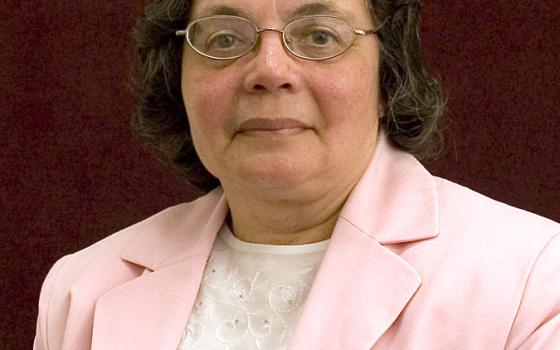Franciscan Sr. Callista Robinson is president of the National Black Sisters Conference, a group of black Catholic women religious formed in 1968 to support, encourage and advocate for black Catholic sisters. Or, as the group’s website puts it, they’ve “been shouting 'Glory! Halleluiah!' since 1968.”
The group was formed at a time when, unfortunately, black sisters needed all the support and encouragement they could get – a forthcoming book shows the history of black women religious in the United States is replete with shocking examples of racism, racial segregation and marginalization, perpetuated by their white religious leaders and peers.
Fortunately, that wasn’t the experience Robinson had, though she did have to deal with the ignorance of the time. Today she coordinates the Brother Booker Ashe Lay Ministry Program in Milwaukee, Wisconsin, which provides academic and spiritual support from an African-American perspective for people who want to be lay ministers in their parishes.
Many black women religious point to having a Catholic education as the starting point for their vocation journey, and it sounds like was not only true for you, but true in a way that reaches back further.
My mother grew up in Jackson, Mississippi, and even though she wasn’t Catholic, she went to Holy Ghost Institute, a high school run by the Holy Ghost Sisters. She was really impressed with the sisters and how they treated the students, and she said if she ever had children, they would all be Catholic. And that is exactly what happened, even both of my parents were United Methodists. [Her mother, Rosina later converted to Catholicism herself.] That has really stuck with me, that Mom insisted that we become Catholic.
My siblings and I attended Catholic schools in Chicago; I entered religious life with two other young women from the same high school – we entered our community together. One of the women had a spiritual director, a Carmelite priest, who wrote to several communities and said – we were called ‘negro’ then – that he had three negro young women interested in religious life and would they be welcome? The response from the Franciscan Sisters of Little Falls, Minnesota, was positive – very positive. The head of the order then, Sr. Thomasine Schmolke, said she was coming to Chicago for a vocation meeting and said she would like to meet us. We were seniors in high school at the time, so we got the day off school – Father vouched for us that we were not playing hooky – and he took us to see her.
I remember she was genuinely concerned about our well-being, she really wanted to get to know us and how we were doing. To us, she was very human. I entered the convent in 1958 and professed final vows in 1964.
That kind of response was, sadly, not the experience for a lot of black women who wanted to become sisters.
No, it wasn’t. I’ve heard several black Catholic women who are mothers and grandmothers now who said that’s what they wanted to do, become sisters, but there was no encouragement. Not that there’s anything wrong with being a mother, by any means, but they should have been encouraged.
When I entered the community, it was the time when we wanted to be the best. That’s how we grew up – you wanted to be the best at whatever you did. So we really made sure we stayed in religious life, stayed in the convent learning the Franciscan way of life.
At that time we didn’t have outright prejudice or racism, but there were things that would be said. For instance, you would hear things like, our third floor, that was called ‘nigger heaven.’ When that happened, I would say something. I couldn’t let that go by. At that time, and I’m sure this was true for most orders, the sisters didn’t mean anything, it was just a manner of speaking, but I never accepted that. They didn’t know any better, but the three of us never accepted that. But we also felt we were accepted, that those things weren’t said out of prejudice.
In 1968, the National Black Sisters Conference was founded, and I’m considered one of the founding members because I attended the very first conference in Pittsburgh. My community encouraged us to go, the three of us, and when I got there I was just in awe. These women were nurses, they were X-ray technicians, hospital administrators. They were in positions within their community and the ministries their communities were involved in. I had never seen that before – so many were doing such wonderful things. So I attended every meeting after that.
You certainly have enough to do without taking on a leadership role at the NBSC. What keeps you going?
These are women who kept the faith. You had these black women in various orders, various ministries, and they were very grounded in who they were. The National Black Sisters Conference opened our eyes to something, that we were loved by God and we had a mission. The question then became, how do we fulfill this mission together? That’s what the National Black Sisters Conference is all about – it’s about strengthening each other.
Each community has its own charism, its own identity, and we need that, too. We also need black women together. We need both – we’re not going to abandon our communities, far from it. We’re here to stay. But we have both, our community and the community of black sisters.
The National Black Sisters Conference is also looking at what’s happening in our country, our young men, our unarmed black men being shot and killed. That’s something we’re very alarmed about. So we’re looking at what can we do as a conference to help alleviate some of those situations. What kind of a voice do we need?
[Dan Stockman is national correspondent for Global Sisters Report. Follow him on Twitter @DanStockman or on Facebook.]

